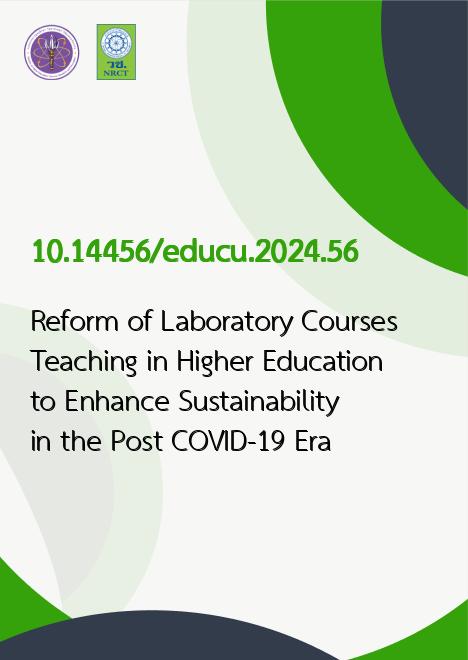
|
Reform of Laboratory Courses Teaching in Higher Education to Enhance Sustainability in the Post COVID-19 Era |
|---|---|
| รหัสดีโอไอ | |
| Creator | Bin Zhu |
| Title | Reform of Laboratory Courses Teaching in Higher Education to Enhance Sustainability in the Post COVID-19 Era |
| Contributor | Simin Xing |
| Publisher | Centre for Education Innovation, Print and Online Media |
| Publication Year | 2567 |
| Journal Title | Journal of Education Studies, Chulalongkorn University |
| Journal Vol. | 52 |
| Journal No. | 4 |
| Page no. | EDUCU5204008(16pages) |
| Keyword | Higher Education, Instrumental Analysis, Post-COVID-19 Era, Sustainability, Integration |
| URL Website | https://so02.tci-thaijo.org/index.php/EDUCU |
| Website title | Journal of Education Studies, Chulalongkorn University |
| ISSN | 2651-2017 (Online) |
| Abstract | The COVID-19 pandemic has brought many difficulties and challenges to laboratory courses, but also promoted the development and prosperity of various teaching methods and made the position of laboratory instruction in higher education contemplated deeply. On the other hand, the monotonous and constant teaching materials and the formalized and theorized examination form have resulted in students' inertia and perfunctory attitude toward the experiment learning. Facing unpredictable futures and students' indifferent mentality, we urgently need to redesign the curriculum to enhance flexibility and resilience, meanwhile, ameliorate educational achievements. It is an important guiding principle of curriculum design to utilize diversified teaching methods and resources to continuously promote the multi-dimensional sustainable development of higher education under the new normal. In this work, an instrumental analysis experiment course was redesigned, and the students' views and suggestions on the new curriculum were inquired. Then the teaching effect was compared with that of the previous courses since the COVID-19 pandemic. The results indicate that the new curriculum design enables students to achieve better learning results in the three domains of learning. We anticipate that this teaching model will be improved continuously to be generalized to a more extensive educational field. |